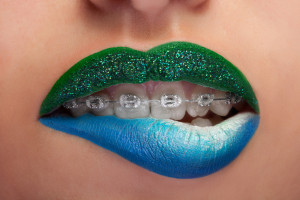 You cared enough about your dental appearance to get braces or aligners. But you can still level up. Over the weeks or months your teeth are straightening, they’ll need more dental hygiene care than ever. Here are some habits you can establish during this time. And, who knows, maybe they’ll be habits you’ll find worth keeping.
You cared enough about your dental appearance to get braces or aligners. But you can still level up. Over the weeks or months your teeth are straightening, they’ll need more dental hygiene care than ever. Here are some habits you can establish during this time. And, who knows, maybe they’ll be habits you’ll find worth keeping.
What goes in must come out
Before we even talk about cleaning your teeth, let’s consider the best ways to make that cleaning process as easy as can be. Let’s talk about foods to avoid while you have braces or aligners.
Hard foods—If it needs to be cracked by your chompers, it can probably crack the wires and loosen the brackets of the braces on your teeth. That spells a lot of extra time in the orthodontist chair and probably a higher orthodontist bill, too. Avoid chewing on ice and hard candies for sure, but realize that healthy foods such as apples, carrots and nuts can cause damage too. In those instances, crush or finely chop the food and chew delicately.
Chewy foods—Gum, taffy, caramel … Say goodbye to those foods and foods like them for a while. Simply put, you can rinse and floss and brush until your heart’s content but you’ll never get all of the sticky food out of your braces until the day they come off.
Starchy foods—Although cereals, rice, potatoes and other starchy foods can be part of a healthy diet, foods like this create an unhealthy scenario for braced teeth. That’s because the plaque buildup commonly caused by starchy foods can stain a braced tooth, which can lead to decay and cavities more easily.
More than floss
Flossing one’s teeth makes an enormous impact on one’s dental health. And when you have braces, this impact becomes even more significant. It’s why you should, first of all, be flossing more than once a day. The increased regimen pays off.
However, the increased regiment doesn’t have to mean increased hassle. To more easily floss—especially under the harder to reach areas like under the wires—use a floss threader, which you can buy at drug stores and some supermarkets. On YouTube, there are a number of tutorials to show you how to best floss your teeth using this method.
You should also consider getting an interproximal—or interdental—brush that cleans between the teeth and supplements both your brushing and flossing efforts. Another option to consider is an oral irrigator or regular rinsing with a mouthwash. Both methods support your overall hygiene effort nicely, but don’t get lulled into laziness. Rinsing with mouthwash and using an irrigator are not brushing and flossing alternatives. They are brushing and flossing support.
More than twice
Brushing twice a day is what every dentist on planet Earth advises for every dental patient. Except for dental patients with braces or aligners. For those folks, brushing after every meal is required to keep dental hygiene high. Breakfast, lunch and dinner are not the only meals we’re talking about. Those afternoon snacks and midnight snacks count too. In other words, if you put food in your mouth, within a half-hour afterward, you should be putting a toothbrush in your mouth, too.
In normal times, you might just start brushing your teeth with toothpaste right away. In times of braces and aligners, a good rinse is going to make brushing a lot more pleasant for you. The amount of particles you can remove from your braces with rinsing is significant. So take that simple step to make cleaning simpler for you.
Brushing with braces requires attention to a little more detail than normal. You want to begin brushing along your gum line, at a 45-degree angle. After that, clean the brackets by brushing at a downward angle on top of the brackets. Do the opposite for the bottom brackets. And then, make sure to rinse again after brushing since you’ve probably dislodged a lot of food particles and you don’t want them to find new spots to cling to.
Other tips
Make sure to used waxed dental floss rather than unwaxed when you have braces. You’ll find it far easier to glide across metal and enamel.
You’re going to hurt your lips and even the inside of your cheeks at some point with all the extra time you spend inside your metallic mouth. Ask your orthodontist to hook you up with wax you can apply to your braces. It will cushion the blow when metal scrapes skin. The insides of your lips and cheeks will thank you later.







Leave a Reply